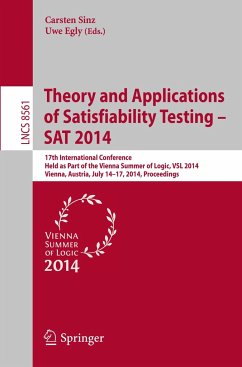
Satisfiability Modulo Theories
Versandkostenfrei!
Versandfertig in 6-10 Tagen
23,99 €
inkl. MwSt.

PAYBACK Punkte
12 °P sammeln!
High Quality Content by WIKIPEDIA articles! In computer science, the Satisfiability Modulo Theories (SMT) problem is a decision problem for logical formulas with respect to combinations of background theories expressed in classical first-order logic with equality. Examples of theories typically used in computer science are the theory of real numbers, the theory of integers, and the theories of various data structures such as lists, arrays, bit vectors and so on. Formally speaking, an SMT instance is a formula in first-order logic, where some function and predicate symbols have additional inter...
High Quality Content by WIKIPEDIA articles! In computer science, the Satisfiability Modulo Theories (SMT) problem is a decision problem for logical formulas with respect to combinations of background theories expressed in classical first-order logic with equality. Examples of theories typically used in computer science are the theory of real numbers, the theory of integers, and the theories of various data structures such as lists, arrays, bit vectors and so on. Formally speaking, an SMT instance is a formula in first-order logic, where some function and predicate symbols have additional interpretations, and SMT is the problem of determining whether such a formula is satisfiable. In other words, imagine an instance of the Boolean satisfiability problem (SAT) in which some of the binary variables are replaced by predicates over a suitable set of non-binary variables. A predicate is basically a binary-valued function of non-binary variables. Example predicates include linear inequalities (e.g., 3x+ 2y - z geq 4) or equalities involving so-called uninterpreted terms and function symbols (e.g., f(f(u,v),v) = f(u,v) where f is some unspecified function of two unspecified arguments.)












